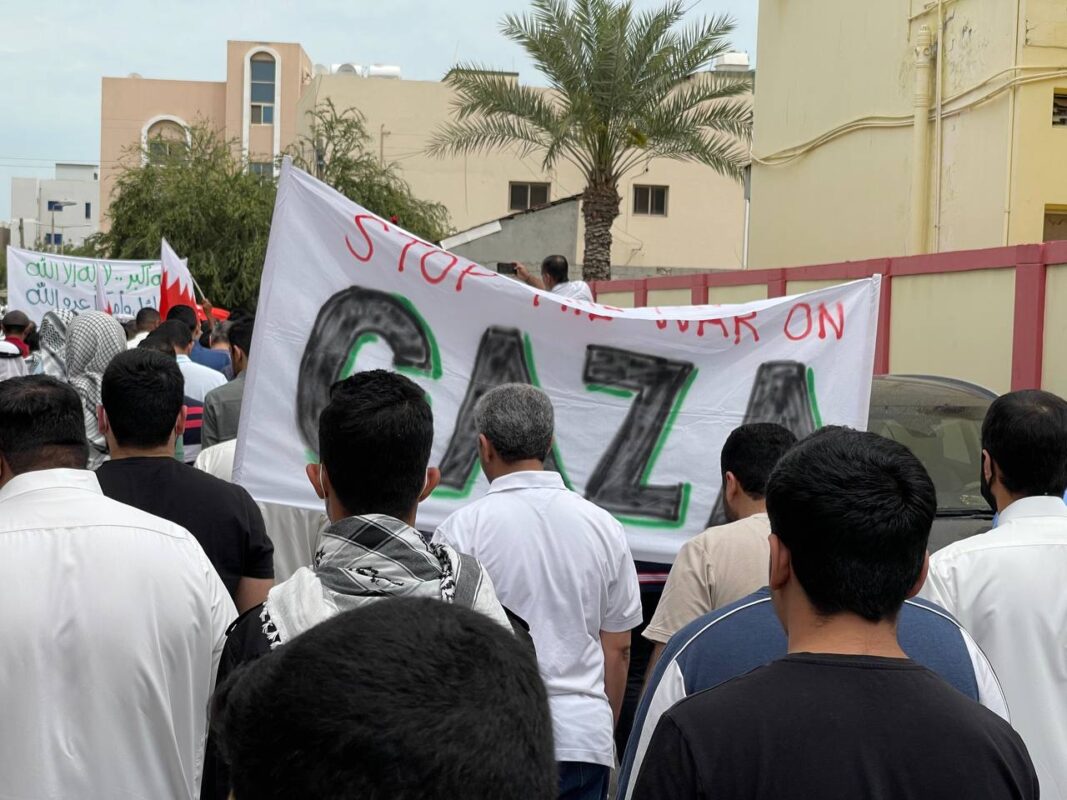On the 15th of December 2023, the Bahraini police arrested 57 people, including 25 children, in response to their participation in pro-Palestine “protests” Serious concerns were raised about the use of torture against teenagers by the authorities.
Since the attack of Hamas on Israel on 07th of October 2023, a wave of a protest in solidarity with Palestine has appeared across the Middle East region. In Bahrain, protests have emerged in the days following the attack, denouncing Israeli military action on Palestine.
However, the Bahraini authorities have violently suppressed these demonstrations. After the first pro-Palestine mass protest took place on the 13th of October, the Bahraini police started interrogating and detaining protesters for their participation in a pro-Palestine demonstration. In the following weeks, the authorities furthered their suppression of the right of assembly, the right of expression, and the right of demonstration by using their anti-riot arsenal against protesters composed of tear gas, stun grenades, and anti-riot shotguns.
In October and November, demonstrators in 8 cities faced violent police action, and at least nine peaceful marches were repressed without justification. Between the 13th of October and the 5th of November 2023, 28 people were arrested, including six minors, with evidence of unjustified violence inflicted on some by the time of the arrest. Other people were arrested and detained because of their online activities in support of Palestine.
An important number of basic human rights have been violated during these arrests and detention. Some protesters have seen their belongings confiscated and were intimated, isolated from their families and lawyers, and tortured.
The pro-Palestine demonstrations in Bahrain have continued despite the brutal and restrictive police responses. Notably, Americans for Democracy and Human Rights in Bahrain (ADHRB) confirmed that on the 15th of December, 57 persons, including 25 children, were arrested for their participation in these protests as well as for their social media posts in support of Palestine on the online platform “X.” Human Rights Watch corroborates this information through interviews of relatives and photographs covering the protests. All speak about violent uses of force from authorities against the protestors, even minors.
Human Rights Watch collected testimonies from mothers whose underaged sons had been randomly detained by the police, even if the teenagers had not participated in the protest by the concerned teenagers. Three families whose underaged sons have been arrested are concerned about their son’s well-being, without any possibility to visit their boys in detention. Additionally, three teenagers’ detention has been extended without explanation and trial. While the condition of the boys detained is unclear as the authorities have transmitted no information, serious concerns have been raised by human rights activists on the use of torture on the teenagers.
In the past, evidence has already been gathered on the use of torture on teenagers in detention by Bahraini authorities. Human Rights Watch published a report in June 2021, documenting verbal, sexual, and physical threats and violence used against underage individuals detained by the Bahraini police.
According to journalists from the New York Times Magazine, protests that have burst out in Bahrain since October have been the biggest since the 2011 Arab Spring. Indeed, activists and protesters on site were surprised by “such a large number in a spontaneous demonstration,” as one human rights activist declared. In addition to the popularity of such movements in support of Palestinians’ condition, these protests have also been the place where anti-Israel and anti-US voices have been raised.
Indeed, many have expressed themselves against the normalization of relations with Israel that happened on the signature of the Abraham Accords, which held the promise of both states to normalize ties, negotiate formal peace treaties, and not antagonize each other. Such discourses could already be heard before the Hamas attack, with organizations like the Bahraini National Initiative against Normalization, which was particularly active, along with the protest movement in Bahrain.
The situation in Bahrain is not isolated. The pro-Palestinian wave of demonstrations has burst out in almost all of the MENA region since last October. Repressive dynamics, such as the one in Bahrain have also been observed in Algeria, Egypt, and Jordan. In Egypt, dozens of pro-Palestine protesters have been detained and prosecuted, while the Egyptian government is publicly and actively supporting the condition of Palestinians. Some observers have interpreted these countries’ repressive mechanisms as responses to the threats posed by such popular political commitment toward Palestine, perceived by Middle Eastern governments as a lever to long-term resentment among their population.

